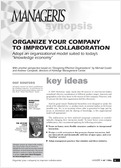The Second Cycle

The key to the success of a totally flexible organizational model.
Author(s): Lars Kolind
Publisher: Wharton School Publishing
Date of publication: 2006
Manageris opinion
Lars Kolind is behind the spectacular turnaround of the Danish hearing aid company, Oticon. In this book, he relates his experience and the lessons drawn concerning the need to make radical changes in the way companies are organized.
His thinking centers on the fact that traditional hierarchies shut companies into a mental model that they then have great difficulty challenging. Hence their blindness when they start to run into problems and their propensity to repeat what has worked in the past, even though these solutions may no longer be suitable.
Kolind recommends the revolutionary organization that he established at Oticon – the spaghetti organization. This is a totally flexible organizational model, with three intersecting dimensions: a project development or operational dimension, a ""professional"" dimension that promotes the development of methods and skills, and a ""human"" dimension to manage careers and professional development. Each employee chooses the projects in which he or she wants to participate, changing activities constantly. The work environment is just as flexible, allowing groups to form and dissolve as needed.
The key to the success of such an organization is effective management by values. That is, every employee must understand the meaning of his or her work and share the company’s vision, rather than having his or her activities dictated from the top. Success also depends on an extended conception of partnership within the boundaries of the organization, as well as with suppliers and customers.
Although this book may seem utopist, it will not leave readers cold. Certainly, some may even be tempted to apply some concrete ideas to their own organizations.
